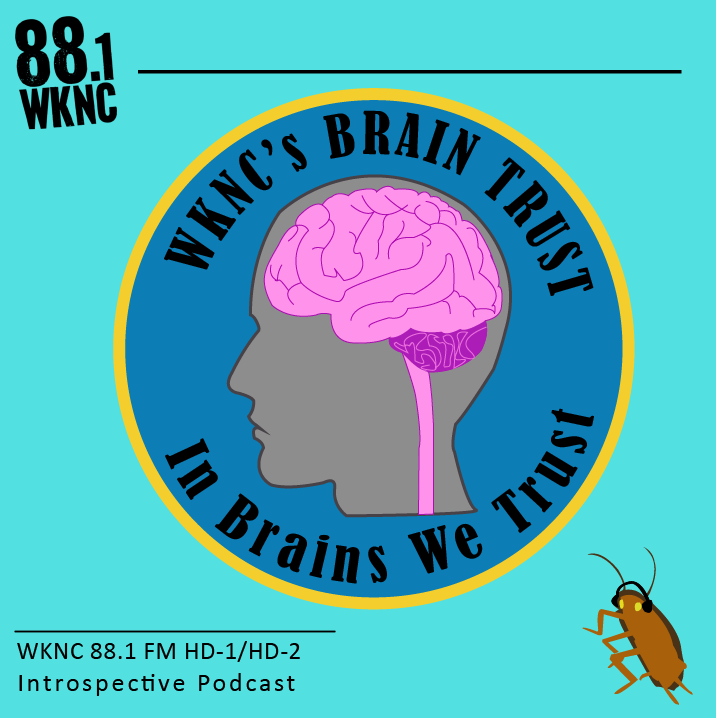
“Brain Trust” is a podcast hosted by Lucas Marsh, a first-year studying aerospace engineering. Recently created, the show aims to have thought-provoking discussions with people from all across NC State.
Marsh informs listeners on a wide range of topics, including masculinity, finances, politics and even nostalgia. Most recently, Marsh sat down with his resident advisor and talked about ADHD, something they have in common.
“I pick something that’s interesting to me that I don’t know much about, or something I do know much about, and I go and find people that have something else to say that’s not what I’m saying,” Marsh said.
One such topic is culture. In episode two, “Conversations on Culture,” Marsh spoke with two student guests about their experience growing up abroad, one in India and the other in Vietnam, and how their background shaped their cultural identity.
After familiarizing himself with media outlets in high school, Marsh discovered NC State’s student radio station WKNC 88.1 when he arrived on campus and decided to get involved.
“They had podcasting open, and I like to talk, so that was perfect for me,” Marsh said. “It was a very obvious opportunity that if I had not taken it, that would have been stupid.”
Starting a new podcast did come with some challenges, one being deciding on a name. “Brain Trust” was originally going to be called “Dorm Roaches,” but the name didn’t fit the topics discussed.
Despite sticking with the name “Brain Trust,” the original roots of the show are shown on the podcast’s logo art. Marsh made a point to include a roach with headphones at the bottom right of the podcast’s logo.
Marsh said while he is an engineering major, he does enjoy other subjects beyond his field of study. From the production of episodes to thinking of new ideas to speak on, he values the creative process.
“It helps me stay well-rounded,” Marsh said. “And it’s definitely a good break from my classes because if I was just doing calculus and physics all day, I think I’d go crazy.”
After thinking of a topic to discuss in an episode, Marsh finds a person around him to talk to on that subject, this person commonly being someone he knows.
“As of right now, I’m very comfortable with what I’m doing,” Marsh said. “It brings a sort of informality to the podcast that I want to be there.”
One of the guests that has been featured in an episode is Marsh’s suitemate, Joey Perkins, a first-year studying industrial engineering.
After realizing that the two come from very different geographical backgrounds, they decided to sit down and have a conversation on where they come from.
“It’s just the differences in what we perceive as normal or comfortable compared to each other,” Perkins said. “So I feel like that’s what really got the ball rolling.”
Marsh’s goal with every episode of his podcast is to get the audience, as well as himself and his guest, to think in a new way.
“I would like [the audience] to feel like they’ve opened a new avenue of thoughts and begin to explore new topics they might not have thought to think about beforehand,” Marsh said.
After being a guest on an episode, Perkins agrees that he had the same experience that a person listening might have had, and said his time brought some interesting perspective changes.
“I would never think about certain things to be normal … to understand that people live a different way than yourself, just seeing how that [norm] can impact your view,” Perkins said.
Having a podcast that challenges common perspectives means that Marsh has had to learn and make changes throughout the episode-making process. This means that the first few episodes are quite different from his newer ones.
“The first few episodes felt scripted,” Marsh said. “They felt boring. So the newer content I’m looking at doing is more exciting for me and hopefully for listeners. And it’s mainly because of the fact that it’s not a structured, scripted thing. It’s just a conversation.”
Having unscripted conversations that can become deep means that the atmosphere must be comfortable for everyone involved. Perkins said the environment created when recording “Brain Trust” is a positive one.
“It creates a good environment to challenge others’ perspectives, like other perspectives of the listeners and even the perspectives of the people who are participating in the podcast themselves,” Perkins said.
When it comes to the future of “Brain Trust,” Marsh said that he wants to keep having these thought-provoking conversations for as long as he can, and as long as he can keep coming up with new ideas.
“I’m just going to keep doing it until I can’t anymore,” Marsh said. “Until I don’t have the time.”
Listeners can find “Brain Trust” on any podcasting platform. Listen to the most recent episode here.